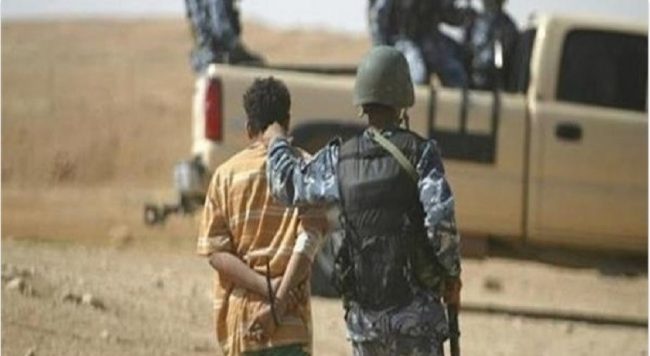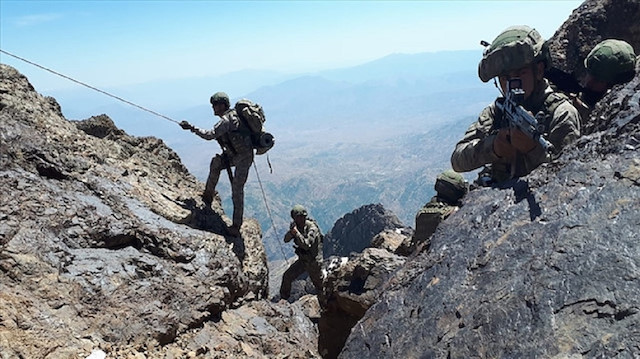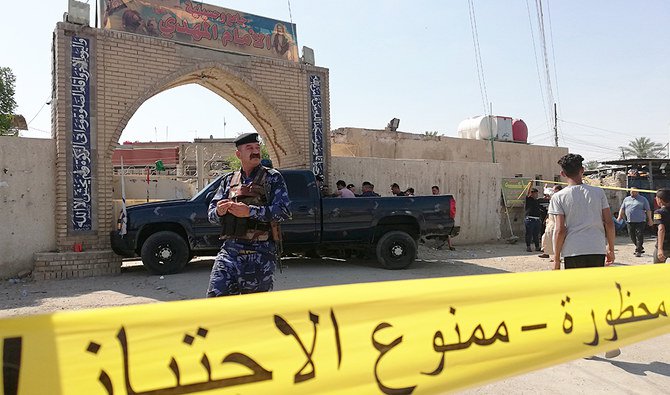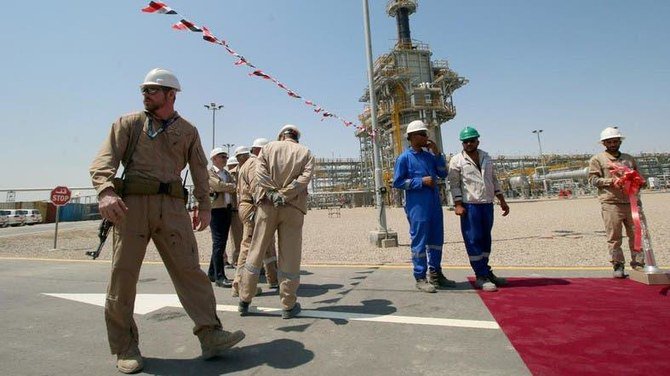www.aljazeerah.info
News, June 2019
Archives
Mission & Name
Conflict Terminology
Editorials
Gaza Holocaust
Gulf War
Isdood
Islam
News
News Photos
Opinion Editorials
US Foreign Policy (Dr. El-Najjar's Articles)
www.aljazeerah.info
|
Editorial Note: The following news reports are summaries from original sources. They may also include corrections of Arabic names and political terminology. Comments are in parentheses. |
7 Kurdish Fighters Killed in Northern Iraq, 7 Worshippers Killed in a Mosque, Exxon's $53 Billion Deal Delayed
June 23, 2019
Editor's Note:
The following are just examples of news stories about the continuous Iraqi government war to subjugate the northern provinces, using the pretext of fighting ISIS, or responding to alleged ISIS attacks, which no longer exists, according to the announcements of the Iraqi government itself.
Daily news stories can be accessed from the news sources listed below and others in the internet. Most likely, the available news stories are biased, as these do not include the two sides.
 |
 |
| An Iraqi soldier arresting a citizen, file, June 23, 2019 | Turkish soldiers in northern Iraq, file, June 23, 2019 |
 |
 |
| A bomb blast killed seven people at a Shiite mosque in eastern Baghdad on Friday and wounded more than 20, June 21, 2019 | Iraqi oil workers |
***
The following are news stories from a pro-Iraqi government website (http://www.iraqinews.com/), which usually reports those who are killed by Iraqi government attacks as Islamic State fighters, implying no civilians were killed by bombing residential neighborhoods:
***
Iraqi security arrest three Islamic State (alleged members) in Samarra
by Mohammed Ebraheem Jun 23, 2019, 12:43 pm
Samarra (IraqiNews.com) –
Iraqi security forces arrested on Sunday three (alleged) members of the Islamic State terrorist group, who are accused of committing terror acts in Samarra city in Salahuddin.
In a press statement, the security media cell said that three IS terrorists, who are wanted by the Iraqi judiciary, were arrested in Samarra city on charges of belonging to the group’s so-called Samarra military wing and carrying out attacks.
All legal procedures were taken against the IS terrorists.
On Saturday, security forces apprehended a smuggler on charges of transferring a number of the Islamic State members from Syria to Iraq after receiving accurate information.
Iraq declared the collapse of Islamic State’s territorial influence in November 2017 with the recapture of Rawa, a city on Anbar’s western borders with Syria, which was the group’s last bastion in Iraq.
IS declared a self-styled “caliphate” in a third of Iraq and neighboring Syria in 2014. A government campaign, backed by a U.S.-led international coalition and paramilitary forces, was launched in 2016 to retake IS-held regions, managing to retake all havens, most notably the city of Mosul, the group’s previously proclaimed capital.
Despite the group’s crushing defeat at its main havens across Iraq, Islamic State continues to launch sporadic attacks against troops with security reports warning that the militant group still poses a threat against stability in the country.
***
Iraq boosts security measures at base where US trainers stay
Arab News, 23 June 2019
BAGHDAD:
Security measures were increased at one of Iraq’s largest air bases that houses American trainers following an attack last week, a top Iraqi air force commander said on Saturday. The US military said operations at the base were going on as usual and there were currently no plans to evacuate personnel. The stepped-up Iraqi security measures at Balad Air Base, just north of the capital, Baghdad, come amid sharply rising tensions in the Middle East between the US and Iran. The current regional crisis is rooted in the US withdrawal last year from the 2015 nuclear deal between Tehran and world powers.
Washington subsequently reimposed sanctions on Iran, sending its economy into freefall and cutting deeply into its oil exports. Gen. Falah Fares told The Associated Press by telephone that the measures include a nighttime curfew, boosting security inside and near the base as well as surveillance of nearby areas. He said these measures are being carried out in coordination with the US “All unnecessary movements have been reduced,” Fares said, adding that the curfew now lasts from sunset until sunrise. He said the change was made after Balad Air Base, home to a squadron of Iraqi F-16 fighter jets, was hit with three mortar shells last week without inflicting casualties. The curfew had previously been from midnight to sunrise, he said. Col. Kevin Walker, US Air Forces Central Command Director of Force Protection, denied in a statement later on Saturday reports that US forces are evacuating contractors or any other personnel from Balad Air Base.
Iraq hosts more than 5,000 US troops, and is home to powerful Iranian-backed militias, some of whom want those US forces to leave.
“Operations at Balad Air Base are continuing as normal. Claims that personnel are being evacuated are categorically false,” Walker said. “There are no plans at this time to evacuate any personnel from Balad.” “The safety and security of all air force personnel and those that provide services to the US Air Force are constantly evaluated, and should there be increased threats to our people, the US Air Force will put measures in place to provide the protections required,” he said. Like neighboring Iran, Iraq has been trying to maintain a fine line between allies Tehran and Washington. There have been concerns that Baghdad could once again get caught in the middle, just as it is on the path to recovery. Iraq hosts more than 5,000 US troops, and is home to powerful Iranian-backed militias, some of whom want those US forces to leave.
***
Turkey neutralizes 58 PKK fighters in north Iraq
Total of 96 fighters, including those in Operation Claw, ‘neutralized’ in northern Iraq since May 27
Yeni Safak News Service 17:32 June 23, 2019 AA
Turkey has neutralized at least seven more PKK (fighters) in northern Iraq's Hakurk region, the country's Defense Ministry said on Sunday.
As part of the ongoing Operation Claw -- which was launched on May 27 by the Turkish Armed Forces against the PKK terror group -- a total of 57 fighters have been neutralized in the Hakurk region over the last four weeks, the National Defense Ministry said in a Twitter post.
The ministry said a total of 96 fighters, including those in Operation Claw, were "neutralized” in northern Iraq during the same period.
Turkish authorities often use the word "neutralized" in statements to imply fighters in question surrendered or were killed or captured.
In its more than 30-year terror campaign against Turkey, the PKK -- listed as a terrorist organization by Turkey, the U.S. and the EU -- has been responsible for the deaths of nearly 40,000 people, including many women and children.
***
7 killed in Baghdad explosion at Shiite mosque
.Arab News, 22 June 2019 AFP Reuters
It was a rare attack on a Shiite place of worship in the Iraqi capital
BAGHDAD:
A bomb blast killed seven people at a Shiite mosque in eastern Baghdad on Friday and wounded more than 20, police sources said.
The blast hit the Imam Mahdi Al-Muntadhar Mosque in Baladiyat, near the massive and densely populated district of Sadr City.
“At least one attacker wearing a belt of explosives tried to enter the building but was stopped by the guards, and detonated himself outside,” one officer said.
“Two civilians were killed and nine people were wounded,” the source said. The second officer confirmed the details and toll for the attack. At the scene, security forces quickly deployed to cordon off the site, a photographer at the mosque said.
It was a rare attack on a Shiite place of worship in the Iraqi capital.
Extremists carried out high-profile bombings of Iraqi Shiite sites during the worst of the country’s sectarian violence after the US invasion that toppled dictator Saddam Hussein in 2003.
Baghdad’s security improved significantly with the defeat of Daesh in 2017 and bomb attacks of any kind in the city have been rare since then.
Iraq has witnessed a rare period of relative calm in recent months after decades of back-to-back conflict, including years of sectarian violence that regularly saw dozens killed in explosions in Baghdad.
***
Iraqi Base That Hosts U.S. Troops Hit By Mortars
RFE, June 15, 2019 11:14 GMT
The Iraqi military says three mortar shells have hit an Iraqi Air
Force base just north of Baghdad where U.S. soldiers are training Iraqi
forces.
In a statement, Iraq’s military said the shelling early
on June 15 ignited a small fire at Balad Air Base but did not result in
any casualties.
The attack occurred amid rising tension in the
Middle East between the United States and Iran, which intensified on
June 13 after suspected Iranian attacks on two oil tankers near the
Strait of Hormuz.
Iran has denied involvement.
The crisis is
rooted in the U.S. withdrawal last year from the 2015 nuclear deal
between Tehran and world powers.
Washington subsequently
reimposed sanctions on Iran and has been pressuring other countries,
including U.S. allies, to join the renewed sanctions.
Based on reporting by AP and Reuters.
***
Exxon’s $53 billion Iraq deal delayed by contract snags and Iran tensions
The Iraqi Prime Minister said last month that the country was close to signing the $53 billion, 30-year energy agreement with Exxon and PetroChina. (Reuters)
Arab News, 21 June 2019 Reuters
The negotiations have been stymied by terms of the contract that Baghdad objects to.
The main sticking point, they said, was the means by which Exxon proposed to recoup its development costs.
BASRA:
Just weeks ago, US energy giant ExxonMobil looked poised to move ahead with a $53 billion project to boost Iraq’s oil output at its southern fields, a milestone in the company’s ambitions to expand in the country.
But now a combination of contractual wrangling and security concerns, heightened by escalating tensions between Iraq’s bigger neighbor Iran and the US, has conspired to hold back a deal, according to Iraqi government officials.
The negotiations have been stymied by terms of the contract that
Baghdad objects to, said Iraqi officials who spoke to Reuters on
condition of anonymity.
The main sticking point, they said, was the
means by which Exxon proposed to recoup its development costs, with the
company aiming to share the oil produced by two fields — something Iraq
opposes, saying it encroaches on state ownership of production. One of
the Iraqi negotiators said Baghdad would not sign anything with the
current terms proposed by Exxon.
ExxonMobil declined to comment on the terms of the contract or the negotiations, with a spokeswoman in Texas saying: “As a matter of practice, we don’t comment on commercial discussions.”
The deputy oil minister for upstream affairs, Fayadh Nema, said on Wednesday that he expected a deal soon.
The negotiations have also been held up by two separate evacuations of Exxon staff from Iraq, a result of escalating regional tension between the United States and Iran.
The first was in May after hundreds of US embassy staff were sent home over unspecified security threats from Iran, which backs a number of Shiite armed groups in Iraq. The second was this week following a rocket attack that was thought to have targeted the company, which local officials blamed on Iran-backed militias.
Tehran has not commented on the attacks, but the evacuations
highlighted the instability in Iraq that is hindering business, fueled
by the US-Iran tensions.
Iraq is one of the only nations in the world
to have friendly relations with both Washington and Tehran; the
arch-enemies are its two biggest allies and Baghdad is caught in the
middle as they vie for influence in the country.
Many Iraqi officials say the stalling of talks with Exxon and disruptions to its staffing point to the limits of American power in Iran’s smaller neighbor, and that US-Iran tensions have led to a series of security incidents, including unclaimed attacks on oil tankers in the Gulf.
“Exxon pulled its staff from Iraq in response to regional unrest. The question is how they will run a $53 billion project with constant regional instability,” said an Iraqi oil official who oversees foreign companies’ operations. “They might abandon work again and that will hurt our energy sector.”
Iraq is the second-largest oil exporter in OPEC and has aims to boost output curtailed by decades of war and sanctions. Such projects are among the most valuable prizes in the world for international oil companies.
An initial agreement would be a boost for Exxon’s plans to expand in Iraq. Under the deal, it would build a water treatment facility and pipelines needed to boost oil output capacity. It would also get the rights to develop at least two southern oilfields — Nahr Bin Umar and Artawi.
In May, US Secretary of State Mike Pompeo discussed the deal with Iraqi Prime Minister Adel Abdul Mahdi twice in three days, an Iraqi government official told Reuters.
Mahdi said last month that Iraq was close to signing the $53 billion,
30-year energy agreement with project leader Exxon and its partner for
the deal, PetroChina.
But the officials who shared details with
Reuters over the proposals from the American oil major said there were
differences between the two parties that could prevent even a
preliminary agreement anytime soon.
Exxon has proposed a production-sharing agreement whereby it recoups its development costs by sharing the output of the Nahr Bin Umar and Artawi fields with the government.
However Iraq has largely opposed such contracts and over the past decade has favored so-called service contracts where companies are paid at a fixed dollar-per-barrel rate.
“We told them that we totally reject any production-sharing mechanism as it contradicts government energy policy,” said an official who is part of the negotiating team.
He said it was too early to say what kind of contract Iraq would favor. The country has also in the past struck infrastructure deals with investment contracts where companies take a slice of profits.
Another official involved in the talks said Exxon’s production-sharing model included a proposal to sell some Iraqi crude itself, rather then through the state oil marketer SOMO, a plan the government strongly rejected.
The complications facing the Exxon deal have come against the backdrop of a rapid escalation in recent weeks, with Tehran rejecting accusations by Washington it was behind attacks on oil tankers and facilities in the Gulf. In a sign of the frustrations felt by Baghdad, Iraqi Oil Minister Thamer Ghadhban said in May that Exxon’s decision to evacuate all its foreign staff from the country then was “unacceptable and unjustified.”
He said it was a political move rather than a security precaution,
without elaborating, and that it had hampered the dealmaking.
“Now
they are out of the country, why should I run after them?” he said at
the time.
Exxon did not comment on Ghadhban’s characterization of its temporary evacuation of Basra staff as “political.”
The US State Department did not immediately respond to a request for comment on whether US Iran policy had affected the deal.
The tussle for influence in Iraq between Washington and Tehran is
reflected in Iraqi politics, with the proposed $53 billion deal a
polarizing issue.
Basma Baseem, an Iraqi lawmaker and a member of the
parliament energy committee said Iraq should push forward with the deal
with Exxon to help Iraq develop its energy sector.
“It’s a major company with billions of dollar of assets and investments across the world and a cutting edge expertise in the oil industry,” she said. “Iraq can benefit significantly from this large deal.”
Politicians from Iran-aligned Shiite Muslim parties portray the deal as extortion, calling it “a new occupation” by the US.
“The government is under a lot of pressure from the Americans to sign
long-term energy and power deals,” said lawmaker Kareem Alewi of the
Iranian-backed Badr Organization, one of the Iraqi parliament’s two
biggest groupings. “This is a trick to control our economy.”
http://www.arabnews.com/node/1514271/business-economy
***Share the link of this article with your facebook friends
Fair Use Notice
This site contains copyrighted material the
use of which has not always been specifically authorized by the copyright
owner. We are making such material available in our efforts to advance
understanding of environmental, political, human rights, economic,
democracy, scientific, and social justice issues, etc. We believe this
constitutes a 'fair use' of any such copyrighted material as provided for
in section 107 of the US Copyright Law. In accordance with Title 17 U.S.C.
Section 107, the material on this site is
distributed without profit to those
who have expressed a prior interest in receiving the included information
for research and educational purposes. For more information go to: http://www.law.cornell.edu/uscode/17/107.shtml.
If you wish to use copyrighted material from this site for purposes of
your own that go beyond 'fair use', you must obtain permission from the
copyright owner.
|
|
|
|
||
|
||||||


